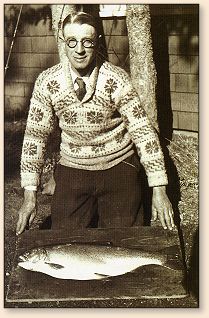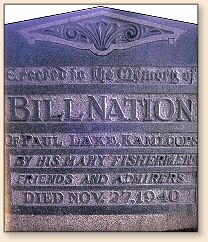Famous British Columbia
Fly-Fishing Waters
By Art Lingren
The Bill Nation Kamloops Area Lakes
Bill Nation became the undisputed master of
British Columbia's Interior trout fly-fishing.
Rod Haig-Brown relied on Nation for information
about Interior fly-fishing for his classic, The
Western Angler, published by The Derrydale
Press in 1939.
In the later 1947 trade edition of The Western
Angler, Haig-Brown paid tribute to Nation
saying that:
he brought to Kamloops trout fishing the most original
mind it has yet known. In a very real way he made the
Kamloops trout his own special fish and his active
mind seemed never to rest from thinking about them...
He was a really good fly-fisherman himself and as
fine a guide as man could want excellent company
on the water and tireless in searching for fish
even on the worst days...
Other men may solve more Kamloops trout problems
than Bill did, make more ingenious imitations and
develop more perfect ways of fishing them. But for
me and for many others Bill will always be the true
pioneer of the fishing, the man whose life was
closer to those particular fish than any other
man's has been or is likely to be. (pp. 114-117)
Arthur William Nation, a quiet, small, bespectacled
man, was born in Bristol, England on June 29, 1881.
He emmigrated to Canada and ended up in British
Columbia, fishing the Kamloops area in the early
1920s. At first he guided around the Little River
area, but in 1927 he moved his headquarters to Paul
Lake and continued to operate out of Paul until his
death in November 1940.
His unique letterhead states that he is an Anglers'Guide:
Specializing in fly-fishing and in trout
fishing tackle of the finest quality
Offering Fishing, among others: Paul, Knouff,
Le Jeune, Hyas, Long, Dee, Jewel, Pillar, Hi Hume,
Big Bar, Canim, Mahood, Murtle, and the two Beaver
Lakes: The Thompson, Adams and Little Rivers, with
a guarantee of at least 100 trout a week Taupo
and Rotorua districts in New Zealand.
And Originator of the Nation's Special and
Silver tip trout flies and the new series of nymphs
of the dragon flies and sedges.
With Special flies for large rainbow and
steelhead trout, including six original patterns
tied personally, $2.00 a dozen.
Offering Hardy and Allcock tackle.
With Headquarters at Echo Lodge, Paul Lake,
Kamloops, BC.
 Nation, a man of the times, was a masterful
fly-fisher and guide who came to the Interior
when waters yielded large fish and many of them.
Even with railroad and primitive road access,
getting to the Kamloops area lakes and streams
was a chore, and costly, so there were few fishers.
In 1927 Nation headquartered at Echo Lodge on Paul
Lake. The lodge, built by J. Arthur Scott in 1922,
offered Nation's well-to-do clients appropriate
accommodations in the heart of Kamloops fly-fishing
country. His clients could enjoy the sport Paul Lake
offered, but he could also take guests on day or
longer trips to other exceptional waters, many that
he advertised on his letterhead.
Nation, a man of the times, was a masterful
fly-fisher and guide who came to the Interior
when waters yielded large fish and many of them.
Even with railroad and primitive road access,
getting to the Kamloops area lakes and streams
was a chore, and costly, so there were few fishers.
In 1927 Nation headquartered at Echo Lodge on Paul
Lake. The lodge, built by J. Arthur Scott in 1922,
offered Nation's well-to-do clients appropriate
accommodations in the heart of Kamloops fly-fishing
country. His clients could enjoy the sport Paul Lake
offered, but he could also take guests on day or
longer trips to other exceptional waters, many that
he advertised on his letterhead.
The lake fishing drew many to the area because in
those waters the trout grew large. By the time
Nation moved his headquarters to Paul Lake, the
fish were not as large as they once were.
Nonetheless, every season fly-fishers consistently
took trout in the three- to five-pound range. Mature
specimens were averaging 8 to 10 pounds.
Nation developed a number of flies for rainbow
trout with some being the first imitations of
insects in those still waters he fished and some
are the first-ever imitations of certain species
of insects.

On his Nation's Black, British Columbia's first
Chironomid imitation, consisting of a few strands
of deer hair and black floss, he took fish up to 8
pounds. His Grey and Green Nymphs were the first-ever
attempts at imitating a dragonfly nymph. Bulky
creations, difficult to cast, and made fun of by
some fishermen, Nation says that "The Special and
the grey and green dragon nymphs account for the
bulk of the larger rainbows. The largest on fly
in recent years weighed 17 Ibs., and took a #4
grey nymph." Nation's Blue was an imitation of
coupled damselfly adults, Nation's Red was an
imitation of coupled dragonflies, Nation's Green
Sedge and Nation's Silver Tipped-sedge were both
imitations of the green sedge nymph, common to many
Kamloops-area lakes. Nation's Fancy, Silver Tip and
Special were more general wet-fly patterns.
That he was an innovative fly designer, there is
no dispute.' However, today's fly-fisherman would
classify many of his patterns as fancy flies and
not many have survived the passage of time. But
it was Nation's skills as an observer of the
natural world and as a fly-fisherman, adopting
and improvising techniques to stillwater fly-fishing,
that made his flies effective fish-catchers.
Many anglers developed a special attachment to
Nation's Special. Bruce Hutchinson in The Fraser
(1950) says:
His [Nation's] memorial is the Nation Special,
the unique fly that he constructed out of his
unequaled knowledge of insect life and the
appetite of the Kamloops trout. No fisherman
can afford to be without Bill's masterpiece.(p. 325)
On examining Echo Lodge's Honour Book, Haig-Brown
noticed that of the 119 large trout between 3 1/2
to 7 1/2 pounds, a Nation's Special deceived 46.
The Jock Scott, with nine fish, was next closest.
Wilderness, solitude, large fish and plenty of
them are some of the attractions that past and
present-day fly-fishers covet. It is true that
Nation experienced all those things, but not
all were serene days back in the 1920s and '30s.
 Canada did not have the Medicare system that we
take for granted today. Throat cancer robbed
Nation of a long life. He claims the cancer was
a result of inhaling contaminated air when using
a spraygun to paint the rowboats, probably with
lead-based paints. He died rich in fishing friends
but poor in material goods and the owners of Echo
Lodge had to sell his fishing equipment to pay for
his burial service. Located in the Kamloops Cemetery,
his grave is marked with a memorial gravestone paid
for by his fishing friends. It states:
Canada did not have the Medicare system that we
take for granted today. Throat cancer robbed
Nation of a long life. He claims the cancer was
a result of inhaling contaminated air when using
a spraygun to paint the rowboats, probably with
lead-based paints. He died rich in fishing friends
but poor in material goods and the owners of Echo
Lodge had to sell his fishing equipment to pay for
his burial service. Located in the Kamloops Cemetery,
his grave is marked with a memorial gravestone paid
for by his fishing friends. It states:
Erected in the memory of Bill Nation of Paul Lake,
Kamloops, by his many fishermen friends and admirers.
Died Nov. 27, 1940. ~ Art Lingren
Continued next time.
Credits: From Famous British Columbia Fly-Fishing Waters, published by Frank Amato Publications. We appreciate use permission.
Our Man In Canada Archives
|

